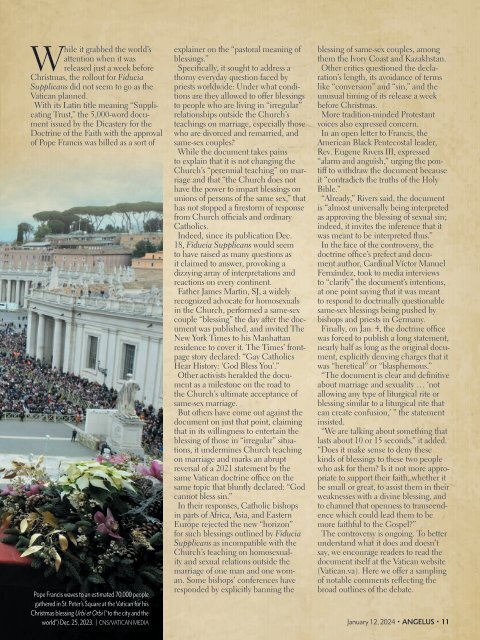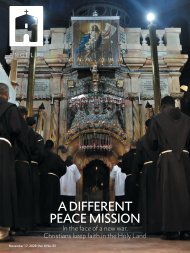Angelus News | January 12, 2024 | Vol. 9 No. 1
On the cover: The Vatican’s new document Fiducia Supplicans on blessings for those in same-sex or “irregular” relationships has probably left the average Catholic with more questions than answers. What does it really say, and why is it so controversial? On Page 10, we break down the saga of the document’s reception with a sampling of some key reactions that illustrate what’s at stake. On Page 20, John Allen explains why the impact of Fiducia on the global Church may be more limited than we think.
On the cover: The Vatican’s new document Fiducia Supplicans on blessings for those in same-sex or “irregular” relationships has probably left the average Catholic with more questions than answers. What does it really say, and why is it so controversial? On Page 10, we break down the saga of the document’s reception with a sampling of some key reactions that illustrate what’s at stake. On Page 20, John Allen explains why the impact of Fiducia on the global Church may be more limited than we think.
You also want an ePaper? Increase the reach of your titles
YUMPU automatically turns print PDFs into web optimized ePapers that Google loves.
While it grabbed the world’s<br />
attention when it was<br />
released just a week before<br />
Christmas, the rollout for Fiducia<br />
Supplicans did not seem to go as the<br />
Vatican planned.<br />
With its Latin title meaning “Supplicating<br />
Trust,” the 5,000-word document<br />
issued by the Dicastery for the<br />
Doctrine of the Faith with the approval<br />
of Pope Francis was billed as a sort of<br />
Pope Francis waves to an estimated 70,000 people<br />
gathered in St. Peter’s Square at the Vatican for his<br />
Christmas blessing Urbi et Orbi (“to the city and the<br />
world”) Dec. 25, 2023. | CNS/VATICAN MEDIA<br />
explainer on the “pastoral meaning of<br />
blessings.”<br />
Specifically, it sought to address a<br />
thorny everyday question faced by<br />
priests worldwide: Under what conditions<br />
are they allowed to offer blessings<br />
to people who are living in “irregular”<br />
relationships outside the Church’s<br />
teachings on marriage, especially those<br />
who are divorced and remarried, and<br />
same-sex couples?<br />
While the document takes pains<br />
to explain that it is not changing the<br />
Church’s “perennial teaching” on marriage<br />
and that “the Church does not<br />
have the power to impart blessings on<br />
unions of persons of the same sex,” that<br />
has not stopped a firestorm of response<br />
from Church officials and ordinary<br />
Catholics.<br />
Indeed, since its publication Dec.<br />
18, Fiducia Supplicans would seem<br />
to have raised as many questions as<br />
it claimed to answer, provoking a<br />
dizzying array of interpretations and<br />
reactions on every continent.<br />
Father James Martin, SJ, a widely<br />
recognized advocate for homosexuals<br />
in the Church, performed a same-sex<br />
couple “blessing” the day after the document<br />
was published, and invited The<br />
New York Times to his Manhattan<br />
residence to cover it. The Times’ frontpage<br />
story declared: “Gay Catholics<br />
Hear History: ‘God Bless You’.”<br />
Other activists heralded the document<br />
as a milestone on the road to<br />
the Church’s ultimate acceptance of<br />
same-sex marriage.<br />
But others have come out against the<br />
document on just that point, claiming<br />
that in its willingness to entertain the<br />
blessing of those in “irregular” situations,<br />
it undermines Church teaching<br />
on marriage and marks an abrupt<br />
reversal of a 2021 statement by the<br />
same Vatican doctrine office on the<br />
same topic that bluntly declared: “God<br />
cannot bless sin.”<br />
In their responses, Catholic bishops<br />
in parts of Africa, Asia, and Eastern<br />
Europe rejected the new “horizon”<br />
for such blessings outlined by Fiducia<br />
Supplicans as incompatible with the<br />
Church’s teaching on homosexuality<br />
and sexual relations outside the<br />
marriage of one man and one woman.<br />
Some bishops’ conferences have<br />
responded by explicitly banning the<br />
blessing of same-sex couples, among<br />
them the Ivory Coast and Kazakhstan.<br />
Other critics questioned the declaration’s<br />
length, its avoidance of terms<br />
like “conversion” and “sin,” and the<br />
unusual timing of its release a week<br />
before Christmas.<br />
More tradition-minded Protestant<br />
voices also expressed concern.<br />
In an open letter to Francis, the<br />
American Black Pentecostal leader,<br />
Rev. Eugene Rivers III, expressed<br />
“alarm and anguish,” urging the pontiff<br />
to withdraw the document because<br />
it “contradicts the truths of the Holy<br />
Bible.”<br />
“Already,” Rivers said, the document<br />
is “almost universally being interpreted<br />
as approving the blessing of sexual sin;<br />
indeed, it invites the inference that it<br />
was meant to be interpreted thus.”<br />
In the face of the controversy, the<br />
doctrine office’s prefect and document<br />
author, Cardinal Víctor Manuel<br />
Fernández, took to media interviews<br />
to “clarify” the document’s intentions,<br />
at one point saying that it was meant<br />
to respond to doctrinally questionable<br />
same-sex blessings being pushed by<br />
bishops and priests in Germany.<br />
Finally, on Jan. 4, the doctrine office<br />
was forced to publish a long statement,<br />
nearly half as long as the original document,<br />
explicitly denying charges that it<br />
was “heretical” or “blasphemous.”<br />
“The document is clear and definitive<br />
about marriage and sexuality … ‘not<br />
allowing any type of liturgical rite or<br />
blessing similar to a liturgical rite that<br />
can create confusion,’ ” the statement<br />
insisted.<br />
“We are talking about something that<br />
lasts about 10 or 15 seconds,” it added.<br />
“Does it make sense to deny these<br />
kinds of blessings to these two people<br />
who ask for them? Is it not more appropriate<br />
to support their faith, whether it<br />
be small or great, to assist them in their<br />
weaknesses with a divine blessing, and<br />
to channel that openness to transcendence<br />
which could lead them to be<br />
more faithful to the Gospel?”<br />
The controversy is ongoing. To better<br />
understand what it does and doesn’t<br />
say, we encourage readers to read the<br />
document itself at the Vatican website<br />
(Vatican.va). Here we offer a sampling<br />
of notable comments reflecting the<br />
broad outlines of the debate.<br />
<strong>January</strong> <strong>12</strong>, <strong>2024</strong> • ANGELUS • 11

















